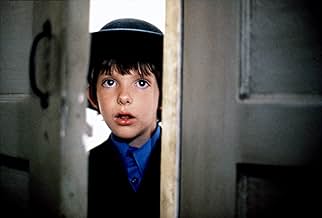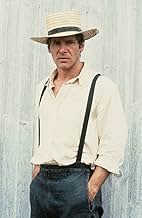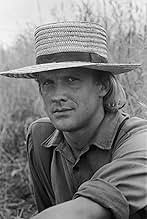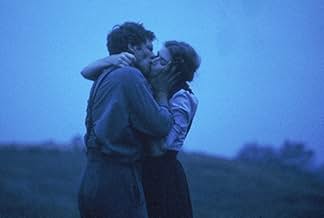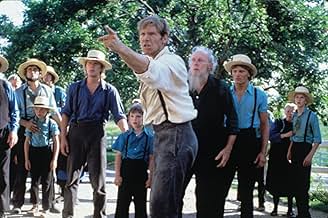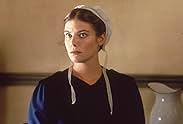Quando um jovem Amish é a única testemunha de um assassinato, o policial John Book se esconde no país Amish para protegê-lo até o julgamento.Quando um jovem Amish é a única testemunha de um assassinato, o policial John Book se esconde no país Amish para protegê-lo até o julgamento.Quando um jovem Amish é a única testemunha de um assassinato, o policial John Book se esconde no país Amish para protegê-lo até o julgamento.
- Direção
- Roteiristas
- Artistas
- Ganhou 2 Oscars
- 13 vitórias e 28 indicações no total
Resumo
Reviewers say 'Witness' is acclaimed for its crime thriller elements and cultural exploration, highlighting Harrison Ford's nuanced performance. The Amish community portrayal, though sometimes romanticized, adds depth. The romantic subplot is noted for its subtlety. Peter Weir's direction and cinematography are praised, yet some criticize plot inconsistencies and pacing. The soundtrack, though fitting, occasionally clashes with the film's tone.
Avaliações em destaque
'Witness' is about a guy who is a total product of the big city - he's a tough cop, he relies on cars, phones, and guns - who hides at an Amish farm to prevent a boy (the witness) and himself from being found by the killers.
The film is less about Harrison Ford learning to live among the Amish as it is the Amish learning to live with Ford. He is a man who at first glance has no matching ideals. The film is fantastic on that level, especially thanks to Peter Weir's direction, who brilliantly shows Ford gradually becoming accepted by the Amish men.
There is very little dialogue among the characters, and Rachel (McGillis) talks even less, not because she doesn't have anything to say, but because Amish rules of life don't seem to allow her to. They are presented as a quiet people, so McGillis has the difficult task of making Rachel speak without dialogue, and she does it well, which carries over to Ford (he got an Oscar nomination, she didn't).
It's only at the climax of the film, when the action takes over that the film begins to weaken. The filmmakers seem to have some kind of answer to how the killer's storyline should be resolved, but it's not very good.
Despite the flaw, the film is excellent based on the performances of the cast, the editor who had to put all the dialogue-less scenes together (and later, won the Oscar for it), and Weir's masterful handling of the story.
The film is less about Harrison Ford learning to live among the Amish as it is the Amish learning to live with Ford. He is a man who at first glance has no matching ideals. The film is fantastic on that level, especially thanks to Peter Weir's direction, who brilliantly shows Ford gradually becoming accepted by the Amish men.
There is very little dialogue among the characters, and Rachel (McGillis) talks even less, not because she doesn't have anything to say, but because Amish rules of life don't seem to allow her to. They are presented as a quiet people, so McGillis has the difficult task of making Rachel speak without dialogue, and she does it well, which carries over to Ford (he got an Oscar nomination, she didn't).
It's only at the climax of the film, when the action takes over that the film begins to weaken. The filmmakers seem to have some kind of answer to how the killer's storyline should be resolved, but it's not very good.
Despite the flaw, the film is excellent based on the performances of the cast, the editor who had to put all the dialogue-less scenes together (and later, won the Oscar for it), and Weir's masterful handling of the story.
An earlier comment on the site suggests that the film is flawed because the Amish boy, coming from a secure, peaceful environment, would not be able to witness a scene of brutality without becoming utterly traumatised.
Far from being a flaw, I believe this is a key statement of the theme of the film - that the close, peaceful and loving upbringing he has enjoyed provide the boy with an emotional strength and resilience that allows him to recognise evil and reject it. Later that same environment will provide the embittered and emotionally scarred with a temporary oasis where he can in part recover from the loveless violence of his own life.
Contrast the failure of community in the vast and soulless terminal building, where the first scene is set, where every one is isolated by the indifference and aggression of their fellow travellers, with the co-operative endeavour of the justly famous barn raising scene, where even the outsider is welcomed and included in an act of joint creation.
Far from being a flaw, I believe this is a key statement of the theme of the film - that the close, peaceful and loving upbringing he has enjoyed provide the boy with an emotional strength and resilience that allows him to recognise evil and reject it. Later that same environment will provide the embittered and emotionally scarred with a temporary oasis where he can in part recover from the loveless violence of his own life.
Contrast the failure of community in the vast and soulless terminal building, where the first scene is set, where every one is isolated by the indifference and aggression of their fellow travellers, with the co-operative endeavour of the justly famous barn raising scene, where even the outsider is welcomed and included in an act of joint creation.
I just recently watched this movie in my Development of Film class. We're studying the Social Drama. Last week we watched "Fury" with Spencer Tracy, so this week we watched a contemporary film in the genre. I have to give it up for Peter Weir! He did a spectacular job!
The premise is intriguing. A young Amish boy goes to the bathroom in a train station and witnesses a bloody murder. Enter Philadelphia cop John Book (Harrison Ford). Now, we had several discussions about this film and I started to realize some flaws that didn't exactly come clear in my mind at the time. First of all, a little innocent Amish boy isn't going to witness something that grisly and recover that well. Living in an Amish environment, he probably doesn't even know the definition of the word "violence." So the boy wouldn't be able to return to his native environment and go on with his life like usual. He'd keep having nightmares and flashbacks. He'd be traumatized 'til the day he dies! However, I have to note Lukas Haas delivered a terrific performance. I'm not sure how much appraise he got for this moderately thankless role. For a boy of his age to take on a role like that, I have to commend him. Lukas, in recent years, has concentrated on more independent works like "Boys" with Wynona Ryder and the underrated "johns" with David Arquette, in which he plays a gay prostitute. He's still a fine actor, and I'm impressed to see his advancement to more grown-up roles, but many probably forgot about him. So I think he should be remembered for that little role, even to this day. But typical Hollywood, Harrison Ford agrees to do a film--he's the star! And the whole subplot with the little boy gets pushed aside. Now, Harrison was terrific in this movie--probably why I wasn't bothered too much about him being the center of attention--and I think he's a very underrated actor (sure he's widely known, but recognize him more as a macho action hero than an actor), but I think if Weir decided to expand that subplot it would've made a more interesting film.
Kelly McGillis is convincing as the boy's Amish mother, who gets swept away by Book. Even as an Amish woman, I think she looked beautiful. I haven't exactly been traveling around Amish country, but I don't know how often you would find an Amish woman that beautiful. Plus, that scene where she's sponge-bathing topless--Wow! That brings me to another point. I like how Weir never actually decided to put a sex scene to demonstrate the relationship between her and Book. In the aforementioned sponge-bathing scene, there's a long period where they just stare at each other and there's absolutely no dialogue! I found that very impressive. It's a very erotic scene, without them actually having to jump into bed together. That's something you rarely see in the movies. The sexual tension between the two characters is simply impressed by their mannerisms. Danny Glover is convincingly frightening as the villain. Also look for an early performance by Viggo Mortensen. He doesn't have many--in fact, I don't if he has any--speaking parts, but he's in quite a few scenes.
There's a lot of good fish-out-of-water comedy when the city-born Book tries to learn the ways of the Amish. I was cracking up when Harrison puts on the Amish garb, with the bottom of his pants above his ankles. That's a picture worth a thousand words. Weir is fascinated by clashes in cultures, and it's highly evident in many scenes from this movie. Those scenes provide some good comic relief. This may be considered typical Hollywood, but I loved the scene where Harrison Ford gets out of the chariot (now as one of the Amish) to beat the crap out of one of the thugs who was giving them trouble. That was an awesome scene! Weir also captures some beautiful, sometimes breathtaking, shots of the scenery. The music is great too, especially in the barn-raising scene. The ending is well-done, and I liked how it wasn't one of those walk-into-the-sunset conclusions. I don't want to give anything away, but that was one of the non-typical Hollywood elements of the film.
Despite its now-discovered flaws, I still love this movie and wouldn't mind watching it on many repeat viewings. It's just a fascinating, wonderfully made piece of cinema that will hold its place in the history of celluloid. I urge you to witness this triumphant work!
My score: 9 (out of 10)
The premise is intriguing. A young Amish boy goes to the bathroom in a train station and witnesses a bloody murder. Enter Philadelphia cop John Book (Harrison Ford). Now, we had several discussions about this film and I started to realize some flaws that didn't exactly come clear in my mind at the time. First of all, a little innocent Amish boy isn't going to witness something that grisly and recover that well. Living in an Amish environment, he probably doesn't even know the definition of the word "violence." So the boy wouldn't be able to return to his native environment and go on with his life like usual. He'd keep having nightmares and flashbacks. He'd be traumatized 'til the day he dies! However, I have to note Lukas Haas delivered a terrific performance. I'm not sure how much appraise he got for this moderately thankless role. For a boy of his age to take on a role like that, I have to commend him. Lukas, in recent years, has concentrated on more independent works like "Boys" with Wynona Ryder and the underrated "johns" with David Arquette, in which he plays a gay prostitute. He's still a fine actor, and I'm impressed to see his advancement to more grown-up roles, but many probably forgot about him. So I think he should be remembered for that little role, even to this day. But typical Hollywood, Harrison Ford agrees to do a film--he's the star! And the whole subplot with the little boy gets pushed aside. Now, Harrison was terrific in this movie--probably why I wasn't bothered too much about him being the center of attention--and I think he's a very underrated actor (sure he's widely known, but recognize him more as a macho action hero than an actor), but I think if Weir decided to expand that subplot it would've made a more interesting film.
Kelly McGillis is convincing as the boy's Amish mother, who gets swept away by Book. Even as an Amish woman, I think she looked beautiful. I haven't exactly been traveling around Amish country, but I don't know how often you would find an Amish woman that beautiful. Plus, that scene where she's sponge-bathing topless--Wow! That brings me to another point. I like how Weir never actually decided to put a sex scene to demonstrate the relationship between her and Book. In the aforementioned sponge-bathing scene, there's a long period where they just stare at each other and there's absolutely no dialogue! I found that very impressive. It's a very erotic scene, without them actually having to jump into bed together. That's something you rarely see in the movies. The sexual tension between the two characters is simply impressed by their mannerisms. Danny Glover is convincingly frightening as the villain. Also look for an early performance by Viggo Mortensen. He doesn't have many--in fact, I don't if he has any--speaking parts, but he's in quite a few scenes.
There's a lot of good fish-out-of-water comedy when the city-born Book tries to learn the ways of the Amish. I was cracking up when Harrison puts on the Amish garb, with the bottom of his pants above his ankles. That's a picture worth a thousand words. Weir is fascinated by clashes in cultures, and it's highly evident in many scenes from this movie. Those scenes provide some good comic relief. This may be considered typical Hollywood, but I loved the scene where Harrison Ford gets out of the chariot (now as one of the Amish) to beat the crap out of one of the thugs who was giving them trouble. That was an awesome scene! Weir also captures some beautiful, sometimes breathtaking, shots of the scenery. The music is great too, especially in the barn-raising scene. The ending is well-done, and I liked how it wasn't one of those walk-into-the-sunset conclusions. I don't want to give anything away, but that was one of the non-typical Hollywood elements of the film.
Despite its now-discovered flaws, I still love this movie and wouldn't mind watching it on many repeat viewings. It's just a fascinating, wonderfully made piece of cinema that will hold its place in the history of celluloid. I urge you to witness this triumphant work!
My score: 9 (out of 10)
Although I suppose "Blade Runner" is the movie that showed Harrison Ford could do something outside of "Star Wars", I personally think "Witness" was one of the most important movies of his career, because it's a complete departure from a science fiction storyline, and therefore paved the way for all the Tom Clancy stuff and other movies that featured him as a romantic hero. Featuring a rich, startling performance from Ford and a powerful turn by Kelly McGillis (who had only appeared on "One Life to Live", a TV movie and the marvelous film "Rueben, Rueben" at that point in her career) "Witness" still manages to amaze with the suspense that Weir generates in the film.
The contrast between the gritty urban police precinct and the bucolic Amish farm country is one of the best things about the film. Book dressed in a blue shirt and black trousers several inches too short for him, looking like the proverbial fish out of the water, is a sight to behold. All of a sudden he's back in the nineteenth century -- no electricity, no cars, no TV or computers. He might as well be on another planet. And the Amish are as different from him as space aliens; gentle, quiet pacifists, hardworking and industrious, intent on keeping the outside world as far from them as possible. They are neighborly and cooperative; the barn-raising scene is inspiring to watch. We feel sympathy for these quiet, decent people as the outside world keeps encroaching, and see them trying to navigate a horse and buggy on the Interstate. Book has to try to fit into this world, and he gives it his best shot. He joins in the barn-raising, does odd chores around the farm. But the Amish, while they respect his abilities, hold him at arm's length. For one thing, he's falling in love with the young widow Lapp, whose feeling for him is mutual. For another, his assimilation is only skin-deep; on a trip into town, when a group of local louts start pestering the Amish, Book chips in with a right to the lout's nose that leaves his face a bloody mess. It's going to prove his undoing; back in his precinct, the narcotics agent and the captain have gotten wind of his hideout, and now they come to shut him up once and for all, and silence Samuel as well. 'Witness' is not an action/adventure blockbuster like the movies that made Ford a household name, but it doesn't need pyrotechnics to stand out. It's a well-crafted, well-acted, eminently satisfying movie.
Overall rating: 9 out of 10.
The contrast between the gritty urban police precinct and the bucolic Amish farm country is one of the best things about the film. Book dressed in a blue shirt and black trousers several inches too short for him, looking like the proverbial fish out of the water, is a sight to behold. All of a sudden he's back in the nineteenth century -- no electricity, no cars, no TV or computers. He might as well be on another planet. And the Amish are as different from him as space aliens; gentle, quiet pacifists, hardworking and industrious, intent on keeping the outside world as far from them as possible. They are neighborly and cooperative; the barn-raising scene is inspiring to watch. We feel sympathy for these quiet, decent people as the outside world keeps encroaching, and see them trying to navigate a horse and buggy on the Interstate. Book has to try to fit into this world, and he gives it his best shot. He joins in the barn-raising, does odd chores around the farm. But the Amish, while they respect his abilities, hold him at arm's length. For one thing, he's falling in love with the young widow Lapp, whose feeling for him is mutual. For another, his assimilation is only skin-deep; on a trip into town, when a group of local louts start pestering the Amish, Book chips in with a right to the lout's nose that leaves his face a bloody mess. It's going to prove his undoing; back in his precinct, the narcotics agent and the captain have gotten wind of his hideout, and now they come to shut him up once and for all, and silence Samuel as well. 'Witness' is not an action/adventure blockbuster like the movies that made Ford a household name, but it doesn't need pyrotechnics to stand out. It's a well-crafted, well-acted, eminently satisfying movie.
Overall rating: 9 out of 10.
Witness" works on 3 levels – as a thriller , drama and romance. The thriller elements of the movie appear at the beginning and the ending of the movie, while the middle of the film is basically a drama with a love story in it. It's an interesting combination and while it might not work for those who like pure thrillers or dramas it certainly worked for me. One has to remember that "Witness" is first a electrifying and poignant love story , then the thriller. A romantic thriller.
It's a movie worth watching just for the fact that is first and one of the few films to focus on Amish culture. As a kid I would laugh at their philosophy of life . The more and more I'm getting older the more I'm thinking they are right. The Amish way of life has many virtues - they have a deep faith in God , pacifism , sense of community.
"Witness" is a story about cultural clash between two completely different worlds. Both cultures are forced to come together. Each one had to search out the moralities, prejudices and actions of the other. The film is thankfully devoid of easy moralizing.
It's an interesting thing that Sylvester Stallone ("Rocky") and Jack Nicholson ("One flew over the cuckoo nest") were considered for the role of John Book . While I do believe that they would handle the role very well , I'm happy that Harrison Ford ("Raiders of the lost ark") got the part in the end. Harrison Ford gives his finest performance in "Witness" , the only one which got him an Oscar nomination. Hord walks away from his hero persona (Indiana Jones , Han Solo). His John Book isn't stereotypical cynical and strong cop. His tough enough to be convincing as a city cop , but it's more about his sense of duty and dignity. It's interesting how the film uses Ford's real-life carpenter's talent. Kelly McGillis ("Top gun") also gives a great and underrated performance , the best in her career. Her Rachel is very sensible and lonely woman , who finds soul mate in Book. Both Ford and McGillis have a wonderful chemistry together . The say much more by the things they don't say (for example the bating scene , the dance scene). The romantic plot reaches it's climax with one of the best on-screen kisses in the history of film. This brief-scene is powerful , sincere and moving. The love story here is beautiful and tragic.
Danny Glover("Lethal weapon") does a nice job as the bad guy. Who could forget Lukas Haas ("Inception") as the Amish kid. His cheerful , colorful face is something that can't go unseen. Watch out for Viggo Mortensen ("The Lord of the rings " trilogy) in his debut as an Amish.
Peter Weir gives a brilliant direction . This is a simple story wit heart . Every dramatic moment is powerful and every small scene is important. Weir isn't a action/thriller director , yet he gives us great Hitchcockian set pieces such as the scene in the toilet and the final confrontation in style of "High noon" (silo death).
The screenplay quite rightfully won the Oscar. The film's script by Earl W. Wallace, William Kelley and Pamela Wallace has become a frequent model for budding screenwriters, often used to display clear structure in a screenplay. It is a film about adults, whose lives have dignity and whose choices matter to them just like it's a story about cops.
The soundtrack by Maurice Jarre is good , but I think it would have sounded much better with real orchestra instead of synthesizer. John Searle's cinematography is gorgeous – the scene of raising the barn is cinematic lyricism.
Highly recommended. I give it 8/10.
It's a movie worth watching just for the fact that is first and one of the few films to focus on Amish culture. As a kid I would laugh at their philosophy of life . The more and more I'm getting older the more I'm thinking they are right. The Amish way of life has many virtues - they have a deep faith in God , pacifism , sense of community.
"Witness" is a story about cultural clash between two completely different worlds. Both cultures are forced to come together. Each one had to search out the moralities, prejudices and actions of the other. The film is thankfully devoid of easy moralizing.
It's an interesting thing that Sylvester Stallone ("Rocky") and Jack Nicholson ("One flew over the cuckoo nest") were considered for the role of John Book . While I do believe that they would handle the role very well , I'm happy that Harrison Ford ("Raiders of the lost ark") got the part in the end. Harrison Ford gives his finest performance in "Witness" , the only one which got him an Oscar nomination. Hord walks away from his hero persona (Indiana Jones , Han Solo). His John Book isn't stereotypical cynical and strong cop. His tough enough to be convincing as a city cop , but it's more about his sense of duty and dignity. It's interesting how the film uses Ford's real-life carpenter's talent. Kelly McGillis ("Top gun") also gives a great and underrated performance , the best in her career. Her Rachel is very sensible and lonely woman , who finds soul mate in Book. Both Ford and McGillis have a wonderful chemistry together . The say much more by the things they don't say (for example the bating scene , the dance scene). The romantic plot reaches it's climax with one of the best on-screen kisses in the history of film. This brief-scene is powerful , sincere and moving. The love story here is beautiful and tragic.
Danny Glover("Lethal weapon") does a nice job as the bad guy. Who could forget Lukas Haas ("Inception") as the Amish kid. His cheerful , colorful face is something that can't go unseen. Watch out for Viggo Mortensen ("The Lord of the rings " trilogy) in his debut as an Amish.
Peter Weir gives a brilliant direction . This is a simple story wit heart . Every dramatic moment is powerful and every small scene is important. Weir isn't a action/thriller director , yet he gives us great Hitchcockian set pieces such as the scene in the toilet and the final confrontation in style of "High noon" (silo death).
The screenplay quite rightfully won the Oscar. The film's script by Earl W. Wallace, William Kelley and Pamela Wallace has become a frequent model for budding screenwriters, often used to display clear structure in a screenplay. It is a film about adults, whose lives have dignity and whose choices matter to them just like it's a story about cops.
The soundtrack by Maurice Jarre is good , but I think it would have sounded much better with real orchestra instead of synthesizer. John Searle's cinematography is gorgeous – the scene of raising the barn is cinematic lyricism.
Highly recommended. I give it 8/10.
The Life and Times of Harrison Ford
The Life and Times of Harrison Ford
Take a look back at Harrison Ford's movie career in photos.
Você sabia?
- CuriosidadesIn preparation for her role, Kelly McGillis lived with an actual Amish widow and her seven children for a while before filming began to get the speech cadence down and to observe the daily life of an Amish widowed mother.
- Erros de gravaçãoJohn Book's Volkswagen hit the birdhouse and broke its windshield. Later the car is seen in the barn with an unbroken windshield.
- Cenas durante ou pós-créditosThe closing shot of John Book driving away in his car passing Daniel provides an initial backdrop for the end credits.
- Versões alternativasIn the original theatrical stereo mix, just after John Book is shot, we see a close-up of his gun and a voice-over from an earlier conversation Book had with the captain. We hear the words: "Who else knows about this? "Just you and me." In the DVD version, which contains a remixed 5.1 track, we see the close-up of the gun and then it segues to Book's sister waking up Rachel and her son Samuel, but the voice-over is missing. In addition to that, there are also new sound effects like ambient noise and especially gunshots added throughout. However Arrow's 2023 4K release restores the theatrical mix which contains the original sound effects and the missing parking garage dialogue.
- ConexõesFeatured in At the Movies: Songwriter/Nineteen Eighty-Four/Witness/Mrs. Soffel (1985)
- Trilhas sonoras(What a) Wonderful World
(1959)
Written by Sam Cooke, Herb Alpert and Lou Adler
Performed by Greg Chapman
Courtesy of Abkco Music, Inc.
Principais escolhas
Faça login para avaliar e ver a lista de recomendações personalizadas
Detalhes
- Data de lançamento
- País de origem
- Idiomas
- Também conhecido como
- Testigo en peligro
- Locações de filme
- Empresas de produção
- Consulte mais créditos da empresa na IMDbPro
Bilheteria
- Orçamento
- US$ 12.000.000 (estimativa)
- Faturamento bruto nos EUA e Canadá
- US$ 68.706.993
- Fim de semana de estreia nos EUA e Canadá
- US$ 4.539.990
- 10 de fev. de 1985
- Faturamento bruto mundial
- US$ 68.707.459
- Tempo de duração1 hora 52 minutos
- Cor
- Mixagem de som
- Proporção
- 1.85 : 1
Contribua para esta página
Sugerir uma alteração ou adicionar conteúdo ausente




